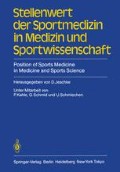Summary
Psychologically competition represents a stress-inducing stimulus. When this stimulus approaches, a status which can be described in physiological and psychological terms results: the pre-start-situation.
This situation causes changes in the biochemistry of the body, in skin resistance, in brain wave patterns and in many other physical processes. Among these processes pulse frequency is most easily measured and gives clear results. This was demonstrated by investigations carried out on students before a 400 m sprint, before trampolin exercises, before diving, before practical examinations in basketball, gymnastics and swimming, and before written examinations. It was found that quite often the pulse rates due to stress before an exam are higher than during the actual exam itself.
In clinical treatment of psychosomatic diseases breathing-biofeedback has proven to be a suitable method of controlling central nervous processes. But the question still remained whether this method could be helpful in sports competition situations. This was investigated with a group of students to see particularly whether breathing-biofeedback is useful for the control of the pre-start-situation, a condition of stress. It was found that this kind of a biofeedback training can indeed reduce the pulse frequency, a sign of stress, during the pre-start situation.
Access this chapter
Tax calculation will be finalised at checkout
Purchases are for personal use only
Preview
Unable to display preview. Download preview PDF.
Literatur
Bathe LN (1975) Erweiterte Untersuchungen mit dem rbf-System und Kontrolle der Ergebnisse von K. Fontheim. Med. Diss., Göttingen
Bauer W, Allmer H, Knobloch J (1973) Subjektive Reaktionsänderungen in der Anti-zipations- und Relaxationsphase einer Wettkampfsituation. In: Feige K et al. (Red) Bericht über den III. Europäischen Kongreß für Sportpsychologie. Hofmann, Schorndorf, S 40–52
Bösel R et al. (1978) Streß, Einführung in die psychosomatische Belastungsforschung. Höffman & Campe, Hamburg
Davidson RJ, Schwartz GA (1976) Patterns of cerebral lateralization during cardiac biofeedback versus the self-regulation of emotion: Sex differences. Psychophysiology 13/1:62–68
Eberspächer H (1979) Streß und Psychoregulation. In: Gabler H, Eberspächer H, Hahn E, Kern J, Schilling G (Hrsg) Praxis der Psychologie im Leistungssport. Bartels & Wernitz, Berlin München Frankfurt
Handt W (1976) Weitere Ergebnisse der Behandlung mit dem respiratorischen Feedback (rfb) unter Einschluß einer Syndromanalyse. Med. Diss., Göttingen
Hatch JP, Gatchel RJ (1979) Development of physiological response patterns concomitant with the learning of voluntary heart rate control. J Comp Physiol Psychol 93/3:306–313
Knobloch J (1977).Streß und Streßanfälligkeit. Dissertation Freiburg
Lazarus RS (1966) Psychological stress and the coping process. Mc Graw-Hill, New York
Leuner H (1977a) Selbstkontrolle vegetativer Funktionen durch Biofeedback-Methoden (Rückkoppelungsverstärkung). Therapiewoche 27:5512–5524
Leuner H (1977b) Das respiratorische Feedback. DJA-Moderne Therapie 9:18–37
Magnussen E (1976) The effects of controlled muscle tension on performance and learning of heart-rate control. Biolog Psychol 4:81–92
Mc Kinney MA, Gatchel RJ, Brantley D, Harrington R (1980) The impact of biofeedback -manipulated physiological chance on emotional state. Basis Appl Social Psychol 1(1):15–21
Nitsch JR (1976) Theoretische Grundlagen sportpsychologischer Beanspruchungsanalysen. In: Nitsch J, Udris I (Hrsg) Beanspruchung im Sport. Limpert, Bad Homburg, S 15–59
Selbach H (1949) Das Kippschwingungsprinzip in der Analyse der vegetativen Selbststeuerung. Fortschr Neurol Psychiatr 17:129–159
Siedeck H (1955) Über die zeitlichen Verhältnisse der phasenförmigen Reizbeantwortung nach Pyrogeninjektion. Acta Neurovegetativa 11:94
Steinbach M (1971a) Medizinisch-psychologische Probleme der Wettkampfvorbereitung. Bartels & Wernitz, Berlin
Steinbach M (1971b) Der sportliche Wettkampf als Stressmodell. Therapiewoche 36: 2613–2617
Steiner H (1976) Leistungsmotivation und Wettkampfanalyse. Czwalina, Ahrensburg
Vaitl D (1975a) Zur Problematik des Biofeedback, dargestellt am Beispiel der Herzfrequenzkontrolle. Psychologische Rundschau 26:191–211
Vanek M, Hosek V (1977) Zur Persönlichkeit des Sportlers. Hofmann, Schorndorf Vester F (1978) Phänomen Stress. DTV, München
Editor information
Editors and Affiliations
Rights and permissions
Copyright information
© 1984 Springer-Verlag Berlin Heidelberg
About this chapter
Cite this chapter
Schmole, M. (1984). Atem-Biofeedback als Regulation des Vorstartzustands. In: Jeschke, D. (eds) Stellenwert der Sportmedizin in Medizin und Sportwissenschaft/Position of Sports Medicine in Medicine and Sports Science. Springer, Berlin, Heidelberg. https://doi.org/10.1007/978-3-642-69916-0_19
Download citation
DOI: https://doi.org/10.1007/978-3-642-69916-0_19
Publisher Name: Springer, Berlin, Heidelberg
Print ISBN: 978-3-540-13661-3
Online ISBN: 978-3-642-69916-0
eBook Packages: Springer Book Archive

